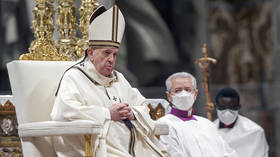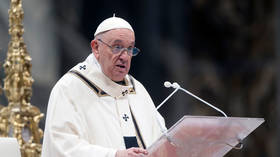VIDEO
Pope weighs in on morality of Covid vaccination calling it a moral obligation
11 Jan, 2022 12:46

The Pope has given his strongest backing yet to the Covid vaccine, siding with the Vatican’s coronavirus advisory board and calling it a “moral obligation,” urging people to show “respect for the health” of others.
Speaking on Monday, Pope Francis used his yearly speech to representatives from 183 countries accredited to the Holy See to address what he sees as important international issues and outline the Vatican’s stance.
The 85-year-old head of the Catholic Church has previously used softer language, describing getting the vaccine as “an act of love,” and insisting they are safe and effective. However, he used the event to take a firmer line, siding with the position held by the Vatican’s Covid advisory body.
Discussing the Covid vaccine, the Pope claimed that everyone has a duty to care for their wellbeing and the safety of individuals around them, stating that “this translates into respect for the health of those around us. Health care is a moral obligation.”
“Vaccines are not a magical means of healing, yet surely they represent, in addition to other treatments that need to be developed, the most reasonable solution for the prevention of the disease,” Pope Francis said.
This backs up a previous statement from the Vatican’s Covid advisory board that claimed Catholics have a “moral responsibility” to get the jab. It said it was “morally acceptable” for people to get jabs which were originally developed using cells from aborted fetuses.
In his call to individuals to get vaccinated, the Papal leader chastised anti-vaxxers who spread “baseless information or poorly documented facts,” expressing concern that people could be “influenced” by misleading claims.
Acknowledging that “ideological divides” have emerged in today’s world, Pope Francis raised concerns that misinformation risks severing “the bond of human reason with the objective reality of things.”
Full speech of Pope Francis: Your Excellencies, Ladies and Gentlemen!
Yesterday concluded the liturgical season of Christmas, a privileged period for cultivating family relationships, from which we can at times be distracted and distant due to our many commitments during the year. Today we want to continue in that spirit, as we once more come together as a large family which discusses and dialogues. In the end, that is the aim of all diplomacy: to help resolve disagreements arising from human coexistence, to foster harmony and to realize that, once we pass beyond conflict, we can recover a sense of the profound unity of all reality.[1]
I am therefore particularly grateful to you for taking part today in our annual “family gathering”, a propitious occasion for exchanging good wishes for the New Year and for considering together the lights and shadows of our time. I especially thank the Dean, His Excellency Mr George Poulides, the Ambassador of Cyprus, for his gracious address to me in the name of the entire Diplomatic Corps. Through all of you, I extend my affectionate greetings to the peoples you represent.
Your presence is always a tangible sign of the attention your countries devote to the Holy See and its role in the international community. Many of you have come from other capital cities for today’s event, thus joining the numerous Ambassadors residing in Rome, who will soon be joined by the Swiss Confederation.
Dear Ambassadors,
In these days, we are conscious that the fight against the pandemic still calls for a significant effort on the part of everyone; certainly, the New Year will continue to be demanding in this regard. The coronavirus continues to cause social isolation and to take lives. Among those who have died, I would like to mention the late Archbishop Aldo Giordano, an Apostolic Nuncio who was well-known and respected in the diplomatic community. At the same time, we have realized that in those places where an effective vaccination campaign has taken place, the risk of severe repercussions of the disease has decreased.
It is therefore important to continue the effort to immunize the general population as much as possible. This calls for a manifold commitment on the personal, political and international levels. First, on the personal level. Each of us has a responsibility to care for ourself and our health, and this translates into respect for the health of those around us. Health care is a moral obligation. Sadly, we are finding increasingly that we live in a world of strong ideological divides. Frequently people let themselves be influenced by the ideology of the moment, often bolstered by baseless information or poorly documented facts. Every ideological statement severs the bond of human reason with the objective reality of things. The pandemic, on the other hand, urges us to adopt a sort of “reality therapy” that makes us confront the problem head on and adopt suitable remedies to resolve it. Vaccines are not a magical means of healing, yet surely they represent, in addition to other treatments that need to be developed, the most reasonable solution for the prevention of the disease.
A political commitment is thus needed to pursue the good of the general population through measures of prevention and immunization that also engage citizens so that they can feel involved and responsible, thanks to a clear discussion of the problems and the appropriate means of addressing them. The lack of resolute decision-making and clear communication generates confusion, creates mistrust and undermines social cohesion, fueling new tensions. The result is a “social relativism” detrimental to harmony and unity.
In the end, a comprehensive commitment on the part of the international community is necessary, so that the entire world population can have equal access to essential medical care and vaccines. We can only note with regret that, for large areas of the world, universal access to health care remains an illusion. At this grave moment in the life of humanity, I reiterate my appeal that governments and concerned private entities demonstrate a sense of responsibility, developing a coordinated response at every level (local, national, regional, global), through new models of solidarity and tools to strengthen the capabilities of those countries in greatest need. In particular, I would urge all states, who are working to establish an international instrument on pandemic preparedness and response under the aegis of the World Health Organization, to adopt a policy of generous sharing as a key principle to guarantee everyone access to diagnostic tools, vaccines and drugs. Likewise, it is appropriate that institutions such as the World Trade Organization and the World Intellectual Property Organization adapt their legal instruments lest monopolistic rules constitute further obstacles to production and to an organized and consistent access to healthcare on a global level.
Principals within are our guide and authority on all things pertaining to our spiritual & physical wellbeing.
